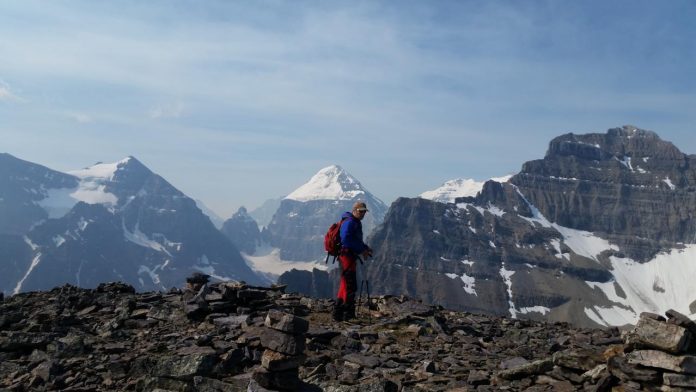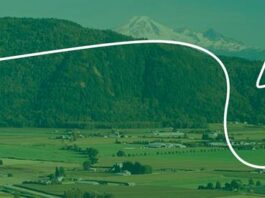Ron Dart grew up near Algonquin Park, in southeastern Ontario. In his 20s he travelled as a ski bum. Eventually he settled in Switzerland, embracing the great Swiss alpine tradition. Returning home to Canada in 1974, Ron found work in the Canadian Rockies leading mountaineering trips. At the time, he studied to become a certified mountain guide.
Ron is thoughtful and steadfast. He’s is a prolific writer and has authored over 30 books. And though he now teaches in the department of political science at UFV, stepping into university took a nudge.
Ron didn’t complete high school and his biggest takeaway was that it wasn’t very useful. Not until his wife suggested he try out a semester of university had he thought about enrolling. The mountain cabin that Dart and his wife lived in was full of books — the continuity for Dart’s life-long pursuit of understanding.
Ron noted that the magnificence of Algonquin Park had a lasting, profound impact on his life. It is the same wild beauty known intimately by the Group of Seven painters.
The Group believed that the best creation of Canadian art would come from immersion within Canada’s wilderness. Similarly, Ron has spent years of his life living in Norway’s far north, with the Sami people; in the Swiss alps, skiing; in Canada, both in the Rockies and Algonquin Park.
What interesting places have your travels taken you?
I spent time at Martin Heidegger’s hut in Germany — probably one of the greatest philosophers of the 20th century -— he would bring his best student out of Fribourg. His great contribution: he was very critical of certain analytical approaches. His interest was very much what’s the relationship with the contemplative to the active, and the role of the mountains as a metaphor of stillness and quietness, of stepping away from the hurly burly of the Valley, of city life.
In these different modes of existence city life is the busyness and the demands, and we often then define ourselves by our accomplishments; our identity comes from that business in the city. Who are you when all of that is gone? So when you go to the mountains, there’s no more demands, the busyness is gone — Who am I when all of that’s stripped? — what T.S. Elliott calls “Being distracted through distractions by distractions.”
How does Heidegger’s work deal with today’s busyness?
Heidegger was very interested in what the West has become in terms of its hyper-driveness, or the dominance of what he called “vita activa,” or the addiction to busy, busy, busy — externally or internally, we can’t stop. We keep popping the pill of one busy thing after another. When you leave that behind and all those things are stripped away, then who are you? That’s when people get quite jittery, it’s almost like they’ve come off their drug. They gotta’ move around, they’ve got to find their iPad or their phone or their book. It’s because we’re so drugged on the vita activa, that when we let go of that, the symptoms of an addiction occur.
What’s in the psychology of mountaineering?
The soul longs for something more than university, than society, can give you. There’s a hunger for something a little more human. Sometimes the structure of civilization prevents people from knowing themselves and being closer to the living reality of nature.
How is being in the mountains similar to education or professorship?
Universities are good on knowledge, information, facts, essays, and papers. But a person can have a BA, MA, a PhD, and not be wise. So what’s the difference between education as wisdom, as knowledge, as facts and stats? And then what’s the relationship with the contemplation of wisdom? A person needs to learn to contemplate what they learn. We have to overcome things to reach a new level of knowledge or self-understanding. Mountains become a metaphor of wisdom, of insight, of self-understanding because they are something to be overcome.
How do you go about leading a mountaineering trip or your classroom?
It depends on people’s temperament. Some people you have to sit with and encourage them along, let them know they can do it, just a step at a time. Some people think big picture and then they can’t conceive how a little step will get them where they want to go. They just think this is too big for me, or the mountain is too big, or the weather is too nasty. If you think along those negative thoughts, inevitably you become impotent and paralyzed. It’s finding each person’s place of optimism where they can find hope. And that’s different for different people. That’s where a leader has to be able to read individuals in a group fairly quick, in terms of both their despair points or their cynicism points.
A teacher has about two or three weeks to figure out the personality of the class, who’s who, and how to move them around to work as a group. That’s part intuition, that’s part reading people.
This interview was edited for length and clarity




